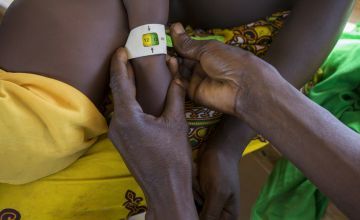
Read our 2024 annual report

Knowledge Hub
Budget 2022 must protect world’s poorest after ‘disastrous’ year

International humanitarian organisation Concern Worldwide has urged the Government to increase funding for overseas development assistance (ODA) in next month’s Budget.
“For the world’s most vulnerable people - already caught in conflict, displaced by crises, experiencing the impact of rapid climate change, and now hit by the COVID pandemic — the last 12 months have been disastrous,” Concern’s Head of Global Advocacy Réiseal Ní Chéilleachair said.
“Eighteen months after Ireland went into its first lockdown, we see a world going in opposite directions“she said. “While wealthier countries are rapidly reopening and arranging booster vaccines, lower income countries are facing further lockdowns as vaccine access remains shamefully inequitable.”
The unanticipated shock of the pandemic has placed further strain on the humanitarian system, with over 235 million people now in need of assistance.
Vital Support
“Budget 2022 is more important than ever before for the world’s poorest,” Ms Ní Chéilleachair said. “We must increase ODA in real terms to allow Ireland keep pace with global needs now and in the post-COVID environment.”
“An increase in ODA would also keep Ireland on course to achieving 0.5% of Gross National Income by 2025, in line with the commitment in the Programme for Government of reaching 0.7% by 2030.”
As part of it representations to Oireachtas members in the run up to Budget 2022, Concern has published a report The Price of Inaction which sets out the scale of the humanitarian challenge globally.
Global Leadership
Budget 2022 is an important opportunity to strengthen Ireland’s global leadership on Zero Hunger by ensuring our ODA is responding to these rapidly rising needs, Ms Ní Chéilleachair said. In particular, it will enable Ireland to use the opportunity of the UN Food Systems and Nutrition for Growth Summits to significantly scale up investments in food security and nutrition between now and 2030.
“Concern is committed to rising to the challenge at this difficult time, to stay and deliver in the world’s toughest environments, but we, and other humanitarian response organisations, need the Irish government’s support more than ever,” she added.
Last year Concern helped 36.9 million people in 23 of the world’s poorest countries.
As a member of Dóchas, Concern is also supporting their other pre-Budget requests (see Notes to the Editor).
To read Concern’s The Price of Inaction report visit https://bit.ly/3kpO8rn
For media queries contact Eamon Timmins, Media Relations Manager, Concern Worldwide, at eamon.timmins@concern.net or 087 9880524.
Notes to the Editor
In addition to the request for increased funding for ODA, the other requests in the Dóchas pre-Budget submission are:
- Ensure additional and targeted financing for climate change mitigation and adaptation to support Least-Developed Countries and Small Island Developing States. This is critical to addressing the climate emergency, recognising the intricate relationship between the impacts of climate change, poverty and conflict;
- Step up its call to protect human rights defenders and promote civil
society at the EU, the UN Security Council, and in other international fora, in order to ensure inclusive approaches to humanitarian aid, development, conflict prevention, resolution and peace-building. In particular, Ireland needs to continue to recognise the value of women and girls, people living with a disability, and other marginalised groups; - As an EU member state, Ireland needs to advocate to ensure that the global community produces enough vaccine doses for everyone, everywhere. EU member states must ensure that COVID-19 vaccines are produced as widely as possible, through the sharing of technical knowledge and know how, free from patents;
- Strengthen Ireland’s global leadership on Zero Hunger by ensuring our ODA is responding to rapidly rising needs. In particular, use the opportunity of the UN Food Systems and Nutrition for Growth Summits to scale up significantly Ireland’s investments in food security and nutrition between now and 2030, applying a food systems approach, which actively advances the right to food.
To read the full Dóchas submission visit https://bit.ly/3hDke1J
Other ways to help
Corporate support
Is your company interested in working together for a common cause?
Fundraise for Concern
From mountain trekking to marathon running, cake sales to table quizzes, there are lots of ways you can support our work.
Buy a gift
With an extensive range of alternative gifts, we have something to suit everybody.
Leave a gift in your will
Leave the world a better place with a life-changing legacy.
Volunteer with Concern
The lots of ways to get involved with our work as a volunteer
School fundraising
Without the generous support from schools, we wouldn't be able to do the work that we do.

